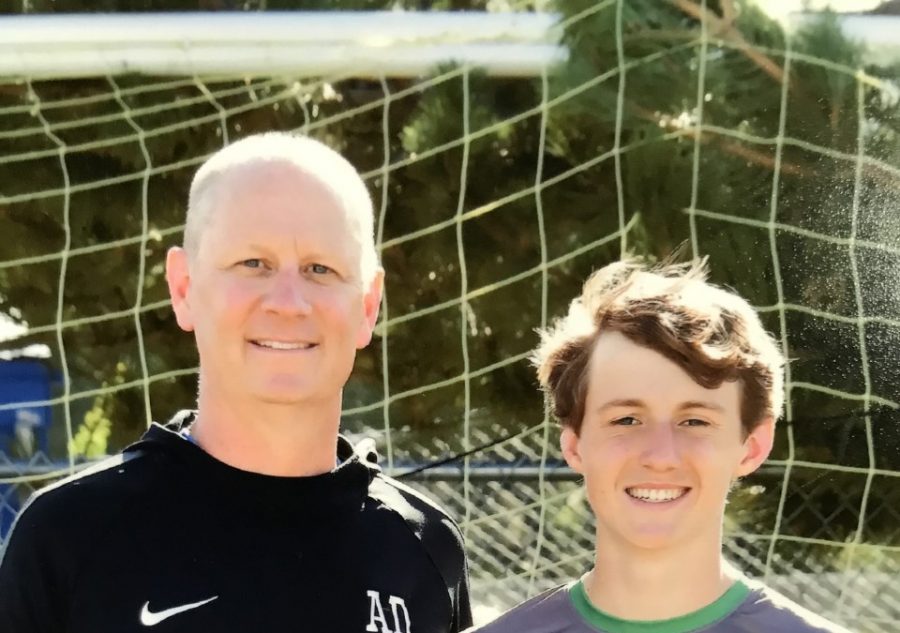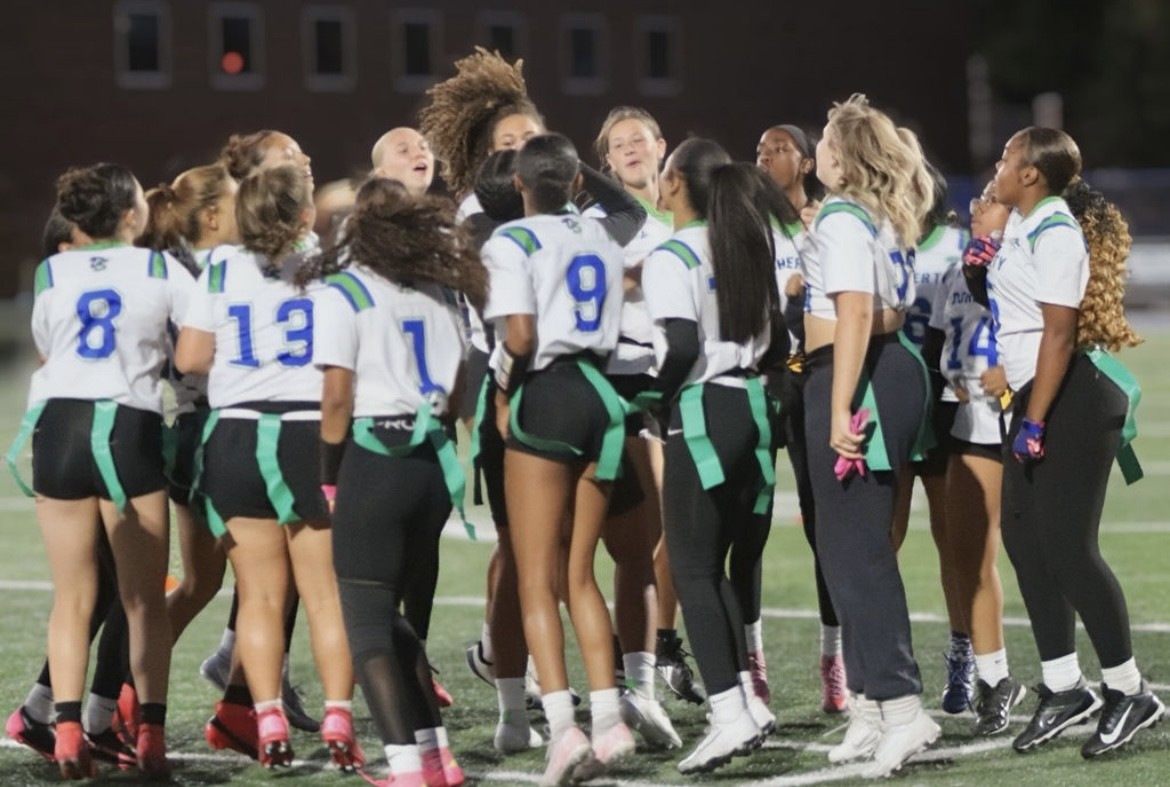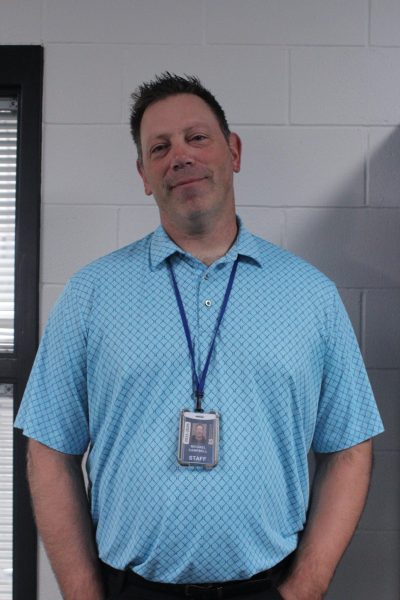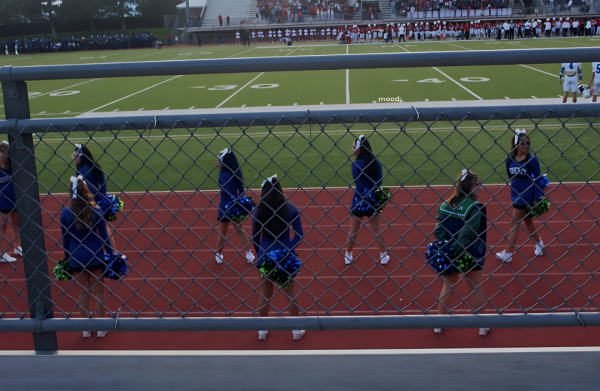Coach Drummond on Coaching and Leaving Your Mark
Photo Courtesy Andrew Drummond
Coach Andrew Drummond posing with his son Noah, who is graduating from Doherty this year.
April 24, 2020
Born in Norman, Oklahoma, Mr. Andrew Drummond is one of Doherty’s AP History teachers. Despite being a college town, “it had a small-town feel,” with, “a lot more variety and diversity… than you would find in some other places.” Mr. Drummond did not attend the University of Oklahoma where his father was a history professor, but instead, “ended up going to Indiana University,” because his parents, “always pushed [him] to go take chances and try something new.” Given that his father was born in Montreal, Canada, and his mother born in Clover, New Mexico, it is no surprise that his parents wanted him to get out and explore places different than his hometown. Mr. Drummond would see his grandparents on his mother’s side much more often than he would see his father’s parents, as his mom’s parents would only have to travel from New Mexico to Oklahoma, as opposed to his father’s traveling from Canada. In fact, Mr. Drummond sr. ‘s parents were, “first-generation… in the ‘New World’,” as they were originally from Scotland. However, due to Mr. Drummond not being able to see his parents’ respective sides very often, he didn’t, “have that experience of aunts and uncles, [or of] extended family that other people have.” Mr. Drummond’s majority of family time was spent with family friends from the university where his father worked. Mr. Drummond was not alone growing up, though, because he also has a sister. She currently lives in Steamboat Springs with her husband and two boys. Attending the University of Kansas, his sister first got a degree in psychology, “but was not really sure what she wanted to do,” which led to her attending UCCS and pursuing a degree in medicine and becoming a physician’s assistant. However, Mr. Drummond did not want to pursue a career in medicine because he doesn’t, “have the courage… or the stomach for it.”
After Mr. Drummond’s parents got married, they had their honeymoon, “in Germany for… 6-8 months because [his] dad was doing research for a book that he was writing.” After their return to the States, Andrew Drummond was born. His parents were in their, “mid-to-late twenties,” when they had him. Drummond followed this pattern, having his first son when he was 31. A huge sports fan, one of Mr. Drummond’s first memories as a kid was just, “playing sports… in the backyard with [his] dad.” The experiences that he had with his parents, “absolutely,” molded him into the person that he is now. Both of his parents were educators, and so their influences gave him many parts of life to love, such as: “teaching, having summers off, [and] coaching.”
As a kid, Mr. Drummond lived on a, “small ranch [with] three bedrooms,” but spent the majority of his time, “[playing] basketball,” and, “football in the front yard… with the neighbors.” However, Mr. Drummond and his parents obviously made sure that his bedroom would be comfortable. In fact, it was so comfortable that he’s kept a majority of the furniture from his old bedroom. He, “still [has] the bed,” but thankfully does not still sleep in it; Mr. & Mrs. Drummond, “gave it to [his] oldest son,” but it’s been left in his son’s old room because he’s moved out. They still have, “the old desk, […] the bookcase, and… the dresser.” Mr. Drummond also used to have a Nerf Basketball hoop, which can be found in the social studies office. Of course, it’s not the same one that he had, but it is still a major reflection of what he loved. In addition to his basketball hoop, Drummond also had an, “old, black and white TV,” that his parents got for him when he was in fifth grade, in which he would, “[come] home from school and [watch] Looney Tunes and Little Rascals.” He would only watch TV for about, “an hour or thirty minutes, […] and then [go] out to play.” Mr. Drummond and his neighborhood friends adored being outside, and so they would, “almost always… play until it was dark.” Even through cold seasons, they just, “wrapped up or… dealt with it.”
Of course, due to Mr. Drummond’s extreme adoration for sports, the person whom he idolized the most was the Dallas Cowboys’ Quarterback Roger Staubach. Despite Roger, “not [being] the best,” Mr. Drummond admired him because, “he always just battled and battled.” Even when times were hard, Mr. Drummond was inspired by Staubach’s inability to give up. Many moments in life can bring difficulty and heartache, and Mr. Drummond has his fair share of these, such as: “…the passing of [his] mom,” or when his, “wife[‘s]… dad died pretty early into [their] marriage.” However, not all sad moments in life are simply that, they can also be bittersweet. When Mr. Drummond’s “son [moved] to college and [was] no longer in the house anymore,” it was sad, “but at the same time, […] extremely happy.” Bittersweet life moments “stand out” because of how different they can be when compared to strictly sad or completely happy moments. “Playing [his] last senior high school soccer game, with [his] dad being the coach,” and even “being done with coaching” altogether were both gigantic things that brought joy and heartache. Happiness and sadness coincide with another, and so one cannot only have sad moments without also enjoying the happy parts, and vice-versa. Along with the moments of heartache and bittersweet joy, Mr. Drummond’s happiest days have come from “[the] birth of [his] two boys, getting married, [and] getting the opportunity to play sports… with [his] dad,” and even going so far as “[winning] a state championship [with him] in soccer in 1986.” Despite many mistakes made and regrets held, Mr. Drummond does not believe that he would ever go back and change anything because “all of it makes [him] who [he is] today.” Even through the low parts, “mistakes[,] and… silly stuff,” he would never change his past.
“I think that we do things when we’re young, and sometimes we wish we didn’t make those mistakes. The pressures of trying to be something can sometimes make us not be very nice people. I’d go back and fix those things, but at the same time, I think those moments where I wasn’t as nice as I should’ve been, or I was around friends who weren’t being nice and I didn’t say or do anything about it; I was too embarrassed, or too afraid of speaking out against my friends when they were doing things… that [weren’t] nice. I think that’s what made me understand things better now. It made me who I am now.”
Once, a few years ago at Doherty, Mr. Drummond was in the gym for a career fair, and “as [he] was leaving, [he] saw these three kids…picking on a special needs kid and trying to get him to things that way they could laugh.” This absolutely enraged Mr. Drummond and caused him to, “[lose his] mind.” Looking back upon this moment, where he “went off on those kids,” he does not regret it whatsoever. “It was the right thing to have done,” he says, and he’s “proud of [himself] for [having done] that,” but he also recognizes that “it’s easy to walk away and say, ‘Oh, it’s not as bad as I think.’” Even though he was obviously, and still is, upset about what those kids were doing, he knows that “consistency’s hard when you’re young,” and so his anger during that moment was “a result of lessons learned being young and making mistakes.”
Despite living in a nice area and being able to afford many things, the Drummond household did not necessarily spend very much money, at least on food. Of course, his mom would go out and “buy stuff for” meals that she would make. His “mom was a really good cook… she was amazing.” However, they “would also go out for nice dinners.” She would make a huge variety of different foods, such as: “steak with a whole bunch of different sauces, like… bearnaise; […] hollandaise for asparagus; […] lasagna and desserts.” Although he couldn’t exactly remember what foods she would make, he does remember that “she was such a great cook.” She “put in the time” when it came to cooking because “she just wanted… to make people happy.” Despite his mom’s lovely cooking, Mr. Drummond never really picked up on her skills, but “[his] wife definitely picked up on stuff [because] she… does talk about how she learned a lot from [his] mom.” In addition to adoring cooking, his mom also “loved looking after… and taking care of” her children. However, “she also liked to get out and do charity work[;] she was very… into organizations like that.”
They didn’t completely abstain from spending except for food, though, as they would also do “some traveling [too],” even though “a lot of family trips were to go see more family, but [they] did go to Europe between [his] fifth and sixth grade year.” They did, however, “move into a much nicer house when [he] was in middle school” because “things… worked out, [and they] were able to… move up and… get some new things [such as…] a swimming pool […], a really… nice basement; [which] was a cool place to hang.” As he progressed through life, his family was able to travel together more, “but… [his] parents [still] weren’t really big spenders. […] They were supportive,” though, and so if Drummond or his sister “wanted to try something and… were serious about it, [their parents] would try to find a way to make it work.”
Although Mr. Drummond and his sister “did what [they] were supposed to,” and “weren’t the type that really pushed it too far,” Mr. Drummond was still “most afraid of [his] dad.” One of the very few times that Mr. Drummond ever got seriously disciplined was “actually… [his] own birthday party.” Drummond was only in second grade, when he and his friends “crossed a busy road,” which led to “the only time [he] ever got spanked.” Due to his well-behaved manner, Mr. Drummond never really got in trouble, but he did, “get grounded… not very often.”
Despite his much deeper fear of his father, as opposed to his mother, Mr. Drummond “fully [admits], with no shame, that [he models his] whole life around [his] dad.” He was more inspired by his parents than any of his own teachers to become one himself. He never “necessarily [saw himself] as a teacher because of any of” his teachers; it was all his dad.
“We were buddies; I looked up to him, and I think I realized more and more, though, how much my mom had [an] impact on things.”eing a music teacher, Mr. Drummond’s mom influenced him in ways that were beyond simple life skills. When he “started playing guitar” he had nothing but support, and was able to get lessons. Like most people, Mr. Drummond cannot pinpoint one song as his all-time favorite.
“I really connect with music. The way it frames my whole understanding of the world and where I was at the time.”
Some of his favorites, though, are songs from “the 80’s… hard rock, fist-pumping excitement.” Of course, he also likes songs from the Beatles: “Let it Be”, “Hey Jude”, and “Here Comes the Sun”. There is always a song playing in his head, but “it’s different at different times.” When he listens to songs such as Kiss’ “Detroit Rock City”, he “can think of being a rebellious junior in high school.” When he’s reminiscing about “listening to A.M. radio in [his] mom’s car,” he gets songs from the 70’s, like “American Pie” by Don McLean, or “Slip Slidin Away” by Paul Simon.
“The first concert I ever went to was Van Halen in 1982. I remember it all. It was Norman, Oklahoma; Lloyd Noble Center; tickets were $12.50 for the biggest band in the world at that time.”
Mr. Drummond and fellow Doherty history teacher Mr. Gilbert “go to concerts all the time.” Together, they have tickets to four shows over the next three months
Mr. Drummond “didn’t have a great history teacher, […] even though [he] always loved history in general.” However, despite his strong love for History, the subject that he “most intrigued [him] and that [he] enjoyed the most… was psychology.” He genuinely was ready to pursue a career in the field of Psychology, but “when [he] went to… college and… started out as a psychology major… [he] was done.” He realized that he was actually more into “the history of psychology more than [he] liked the [concept].” Like many people, he also didn’t want to take another math class.
“When they told me I had to take Statistics, […] I was like, ‘Nope.’ That wasn’t going to work for me.”
In addition to originally wanting to major in Psychology, Mr. Drummond also wanted to play soccer in college, “but going to Indiana University meant going to a program that was Division 1 and one of the top programs.” During his sophomore year in university, his school’s soccer team actually won the national championship. Due to this, he knew that joining the soccer team was going to be “taking on… a big… challenge,” and it sadly did not work out for him. However, it worked out in the end “because [he] had time… for the people [he] got to know in college.” In fact, the best man at his wedding was a friend that he had made during his freshman year in college.
“We lived on the same floor together, and then we were roommates later on.”
Getting the chance to play soccer in college was a dream of his, but he didn’t really get to follow it up. Not everything was lost, though, because “teaching was always part of it.” When he first got out of high school, he thought that he’d “be a professor like [his[ dad, but then… [he…] realized that [he] wanted… to be working with people.”
“I wanted to coach. I didn’t want to be in a library for the next four or five years doing research, and so I changed.”
Mr. Drummond did get the chance to coach soccer, and after many years, this was his last year coaching at Doherty.
“I’m proud of being a part of so many kids’ lives. […] I’m proud of the special relationships that I’ve developed over the years based on that.”
He can “think of… [at least] three… people that played for [him] who are now coaches,” which just goes to show the importance of a well-developed relationship, like what Mr. Drummond tries to build with each and every student he has. Past students and players have invited him to their weddings, and he’s proud of “seeing… what they’ve become.”
“My last game coaching… was this past season. One of my former players knew it was my last game, [and] so he came out and I saw him after the game… It’s just the coolest thing… that they remember, and it’s special. I’m proud of that more than anything else.”
From being a coach, being part of Oprah’s book club, being a music teacher, and being a teacher at multiple schools, Mr. Drummond has been given the opportunity to be involved in so many people’s lives. Out of everything that he has accomplished and done in his life, he just wants “to be remembered as someone who really, truly cared, and never put… on a mask of caring.” He wants the people who were in his life to know that the love he’s shown to others has always been real. He wants people to know that he’s always “really cared, and that [he] helped people transition from being teenagers to being adults; […] that the lessons they learn now [will help] them for the rest of their lives.”





